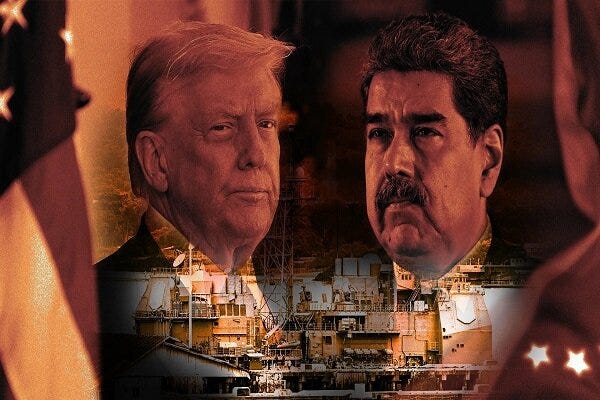Trump’s Shadow War on Venezuela: Power, Perception, and a Manufactured Enemy
From Naval Escalation to Narrative Warfare — How an Ambitious President Turns Foreign Tensions into Domestic Theater
Venezuela, PUREWILAYAH.COM - According to Financial Times, a pressing question now looms: Is U.S. President Donald Trump preparing to overthrow the Venezuelan government?
The deployment of three destroyers, an amphibious assault ship, a missile-equipped cruiser, a nuclear submarine, and a squadron of F-35s right off Venezuela’s coast certainly fuels that suspicion. Add to this a force of 6,500 U.S. Navy and Marine personnel, and the military staging speaks louder than words.
A War Disguised as a Drug Operation
No counter-narcotics operation has ever required such an overwhelming show of force. Trump, known for grand theatrics and self-promotion, appears to be engaging in political spectacle.
Just last week, nearly 800 American generals and admirals were summoned from around the world — not for strategy, but to listen to his rambling declarations.
Venezuela, to Trump, represents a Schrödinger’s war: a conflict both happening and not happening. Yet the possibility of open confrontation feels dangerously close.
Venezuela as an Imagined Enemy
In Trump’s worldview, Caracas is the villain behind the chaos in America’s urban “war zones,” where he has deployed National Guard troops. After Los Angeles and Washington, D.C., cities like Memphis, Chicago, and Portland have become new flashpoints of unrest.
A recent military raid in a Chicago apartment complex targeted the Venezuelan gang “Tren de Aragua.” Trump insists this gang answers to Venezuelan President Nicolás Maduro, whom he often paints as the “vilest thief” of a kleptocratic regime.
But there is little evidence to suggest any such command structure exists. In reality, Tren de Aragua functions as the domestic reflection of Trump’s obsession, while Venezuela serves as its international face.
The Myth of Venezuelan Drug Invasion
Despite not being a major drug source, Venezuela is accused by Trump and his self-styled “Secretary of War,” Pete Hegseth, of fueling America’s addiction crisis.
Yet no fentanyl in the U.S. originates from Venezuela — it primarily comes from Mexico. Colombia remains the largest supplier of cocaine.
In recent weeks, the U.S. has sunk Venezuelan boats in the Caribbean four times under alleged drug-smuggling claims, leaving over 20 dead. Trump even claimed that “bags of fentanyl and cocaine were scattered across the ocean,” though he offered no evidence.
Fabricated Narratives and Political Immunity
To be fair, Trump neither needs evidence nor pretends to believe his own figures. The flimsiest pretexts are enough. The U.S. Supreme Court has offered little resistance to his overreach, making it unlikely to challenge his foreign maneuvers more than his domestic crackdowns.
Each time a Venezuelan boat goes down, Trump claims to have “saved 25,000 American lives.”
Last year, 54,743 Americans died from drug use. Even if one accepted Trump’s imaginary figure of 300,000 drug deaths, it would imply that just 12 Venezuelan speedboats supply the entire U.S. addiction crisis — a mathematical absurdity he doesn’t even bother to justify.
Hawks and Negotiators: A Divided Inner Circle
The most plausible theory is that Trump has not yet decided whether to pursue an outright invasion. Some close allies — especially Marco Rubio, his Secretary of State — openly seek regime change in Venezuela.
Others, like Richard Grenell, both Trump’s envoy to Venezuela and the director of the Kennedy Center for Performing Arts (an astonishing dual role), prefer negotiation.
Both camps understand one thing clearly: Venezuela holds the world’s largest proven oil reserves. Meanwhile, U.S. Attorney General Pam Bondi has just doubled the bounty on Maduro’s head to $50 million, setting the stage for Trump’s spectacle of war.
Trump’s administration operates without any formal policy process. His government is made up of loyalists competing to be “more Trump than Trump.” Once they guess his desires, their mission becomes obvious.
But guesses can go wrong. In July, Hegseth halted weapons shipments to Ukraine, only to learn that Trump didn’t want that — yet.
The decision was embarrassingly reversed, and since then, Hegseth has scrambled to please Trump, including ordering four televised strikes on “unknown” Venezuelan boats. Trump, pleased by these seemingly risk-free fireworks, appears to have developed a taste for them.
Escalation as Entertainment — and Its Deadly Irony
The danger lies in Trump’s belief that escalation is a free bonus — an “extra prize.”
Maduro may lean on Russia and China, but Venezuelans are fighting against U.S. imperial pressure. The bitter irony is this: Trump’s “maximum pressure” campaign has increased Venezuelan migration, including to the U.S., fueling the very crisis he claims to fight.
This only makes sense if Trump has been lying all along about his real objective.
Trump’s saber-rattling toward Venezuela is not strategic policy but political performance — a search for an external enemy to fit an internal narrative. Whether invasion or intimidation, it’s designed for headlines, not peace.
In this stage play of power, facts are optional, lives are expendable, and war is entertainment. But for Venezuela — and the world — the consequences may be all too real. (PW)
Source: Mehr News


